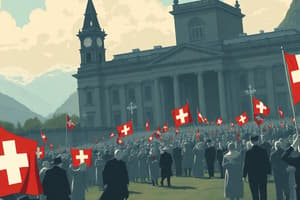Podcast
Questions and Answers
What is a Popular Initiative in Switzerland?
What is a Popular Initiative in Switzerland?
A popular initiative is a process where citizens can demand a change to the Swiss constitution. It requires 100,000 signatures in 18 months and a double majority (both the people and cantons) to pass.
What is the main purpose of an Optional Referendum in Switzerland?
What is the main purpose of an Optional Referendum in Switzerland?
An Optional Referendum allows Swiss citizens to stop a new law passed by Parliament. To initiate an Optional Referendum, 50,000 signatures must be collected within 100 days, and a simple majority is required to overturn the law.
What is the purpose of a Mandatory Referendum in Switzerland?
What is the purpose of a Mandatory Referendum in Switzerland?
A Mandatory Referendum is required for the approval of constitutional amendments. It requires a double majority, meaning it must be approved by a majority of both the population and the cantons of Switzerland.
What is a Direct Counter Proposal?
What is a Direct Counter Proposal?
What does the term 'Indirect Counter Proposal' refer to?
What does the term 'Indirect Counter Proposal' refer to?
What is a Simple Majority?
What is a Simple Majority?
What is the 'Right of Petition'?
What is the 'Right of Petition'?
What is the 'Electoral College'?
What is the 'Electoral College'?
What are 'Parliamentary Bodies' and what purpose do they serve?
What are 'Parliamentary Bodies' and what purpose do they serve?
What is the purpose of 'Committees' in Parliament?
What is the purpose of 'Committees' in Parliament?
What are the key differences between 'Motions' and 'Postulates' in the Swiss Parliament?
What are the key differences between 'Motions' and 'Postulates' in the Swiss Parliament?
Describe the purpose of 'Interpellations' in Parliament.
Describe the purpose of 'Interpellations' in Parliament.
Explain the meaning of 'Parlimentary initiative' in the Swiss Parliament?
Explain the meaning of 'Parlimentary initiative' in the Swiss Parliament?
What are the three levels of law in Switzerland?
What are the three levels of law in Switzerland?
What are the key steps involved in the law creation process in Switzerland?
What are the key steps involved in the law creation process in Switzerland?
What is the significance of 'Parliamentary Groups' in the Swiss Parliament?
What is the significance of 'Parliamentary Groups' in the Swiss Parliament?
Explain the concept of 'Consensus' within the Swiss political system.
Explain the concept of 'Consensus' within the Swiss political system.
What is the 'Principle of Collegiality' in the Swiss Federal Council?
What is the 'Principle of Collegiality' in the Swiss Federal Council?
What does the term 'Concordance' signify in the Swiss political context?
What does the term 'Concordance' signify in the Swiss political context?
What are 'Departements' in the Swiss Federal Administration?
What are 'Departements' in the Swiss Federal Administration?
Explain the meaning of 'Lobbying' in the context of Swiss politics.
Explain the meaning of 'Lobbying' in the context of Swiss politics.
A Popular Initiative requires a double majority to pass.
A Popular Initiative requires a double majority to pass.
An Optional Referendum requires a double majority to pass.
An Optional Referendum requires a double majority to pass.
Parliamentary Groups are formed by members of the same political party.
Parliamentary Groups are formed by members of the same political party.
The Swiss Federal Administration is divided into four departments.
The Swiss Federal Administration is divided into four departments.
Lobbying is illegal in Switzerland.
Lobbying is illegal in Switzerland.
Interpellations are used to request information from the Federal Council.
Interpellations are used to request information from the Federal Council.
The Swiss Parliament is composed of one chamber.
The Swiss Parliament is composed of one chamber.
The Principle of Collegiality requires Federal Council members to always agree with each other.
The Principle of Collegiality requires Federal Council members to always agree with each other.
A Postulate requires the Federal Council to take immediate action.
A Postulate requires the Federal Council to take immediate action.
A Direct Counter Proposal is an attempt to overturn a Popular Initiative.
A Direct Counter Proposal is an attempt to overturn a Popular Initiative.
Consensus in Swiss politics requires unanimous agreement.
Consensus in Swiss politics requires unanimous agreement.
Flashcards
Popular Initiative
Popular Initiative
The Swiss citizens can propose changes to the constitution with 100,000 signatures in 18 months and require a double majority (people and cantons) to pass.
Optional Referendum
Optional Referendum
The Swiss citizens can stop a new law passed by parliament by gathering 50,000 signatures in 100 days and achieving a simple majority (more yes than no) vote.
Mandatory Referendum
Mandatory Referendum
Constitutional amendments require approval by the Swiss citizens through a vote. A double majority (people and cantons) is needed for the amendment to pass.
Direct Counter Proposal
Direct Counter Proposal
Signup and view all the flashcards
Indirect Counter Proposal
Indirect Counter Proposal
Signup and view all the flashcards
Simple Majority
Simple Majority
Signup and view all the flashcards
Double Majority
Double Majority
Signup and view all the flashcards
Right of Petition
Right of Petition
Signup and view all the flashcards
Electoral College
Electoral College
Signup and view all the flashcards
Parlimentary Bodies
Parlimentary Bodies
Signup and view all the flashcards
Committees
Committees
Signup and view all the flashcards
Motion
Motion
Signup and view all the flashcards
Postulate
Postulate
Signup and view all the flashcards
Interpellation
Interpellation
Signup and view all the flashcards
Parlimentary Initiative
Parlimentary Initiative
Signup and view all the flashcards
Levels of Law
Levels of Law
Signup and view all the flashcards
Law Creation
Law Creation
Signup and view all the flashcards
Parlimentary Groups
Parlimentary Groups
Signup and view all the flashcards
Consensus
Consensus
Signup and view all the flashcards
Principle of Collegiality
Principle of Collegiality
Signup and view all the flashcards
Concordance
Concordance
Signup and view all the flashcards
Departements
Departements
Signup and view all the flashcards
Lobbying
Lobbying
Signup and view all the flashcards
Political Initiative
Political Initiative
Signup and view all the flashcards
Law Revision
Law Revision
Signup and view all the flashcards
Equality Legislation
Equality Legislation
Signup and view all the flashcards
Labour Law
Labour Law
Signup and view all the flashcards
Direct Democracy
Direct Democracy
Signup and view all the flashcards
Semi-Direct Democracy
Semi-Direct Democracy
Signup and view all the flashcards
Parliamentary System
Parliamentary System
Signup and view all the flashcards
Presidential System
Presidential System
Signup and view all the flashcards
Study Notes
Popular Initiative
- Requires a change to the constitution.
- Swiss citizens (over 18, mentally competent) are involved.
- Needs 100,000 signatures within 18 months.
- Requires a double majority (people and cantons).
Optional Referendum
- Halts a new law proposed by parliament.
- Swiss citizens (over 18, mentally competent) are involved.
- Needs 50,000 signatures within 100 days.
- Requires a simple majority (more yes than no votes).
Mandatory Referendum
- Requires approval of constitutional amendments.
- Swiss citizens are involved.
- Requires a double majority (people and cantons).
Direct Counter Proposal
- Parliament creates a new constitutional bill to address a popular initiative.
- Both bills are voted on together.
Indirect Counter Proposal
- Parliament proposes a bill to address concerns raised by a popular initiative, but at a lower level (not constitutional).
- No direct vote is required.
Simple Majority
- More "yes" votes than "no" votes are needed.
Double Majority
- Majority support from both the people and the cantons is necessary.
Right of Petition
- Citizens can submit concerns, complaints, or proposals to the government.
- This is a core element of democracy.
Electoral College (US)
- A system for electing the president in the US.
- Each state has assigned votes.
Parliamentary Bodies
- Formal groups within parliament, like committees, chambers, and councils.
- Responsible for creating and voting on laws/policies.
Committees
- Groups of parliament members specializing in specific topics.
- They discuss topics before full parliament debate.
Motion
- Directs the Federal Council to present a bill to parliament or take action.
Postulate
- Asks the Federal Council to examine and potentially submit a bill to parliament or take action.
Interpellation
- Asks the Federal Council for information about important domestic or foreign events/federal matters.
Parliamentary Initiative
- A council member or parliamentary group proposes a new law.
Levels of Law
- Constitution, Laws, Regulations.
Law Creation Process
- Initial Phase: People, parliament, cantons, or the Federal Council initiate a bill.
- Parliamentary Phase: Committees review and chambers vote on the bill. Each article needs approval.
- Vote and Entry into Force: Law takes effect automatically, unless a referendum is called.
Parliamentary Groups
- Groups of at least five parliament members formed to advocate for/discuss policies.
- Larger groups have more influence over committees.
Consensus
- Shared agreement/unified opinion among members.
Principle of Collegiality
- Federal Council members defend the council's views even if not personally their own.
Concordance
- All parties participate in decision-making (not a competitive system).
Departments
- The federal administration is divided into seven departments each headed by a Federal Councillor.
- There's a Federal Chancellery as well.
Lobbying
- Influencing politicians through direct contact.
Studying That Suits You
Use AI to generate personalized quizzes and flashcards to suit your learning preferences.




